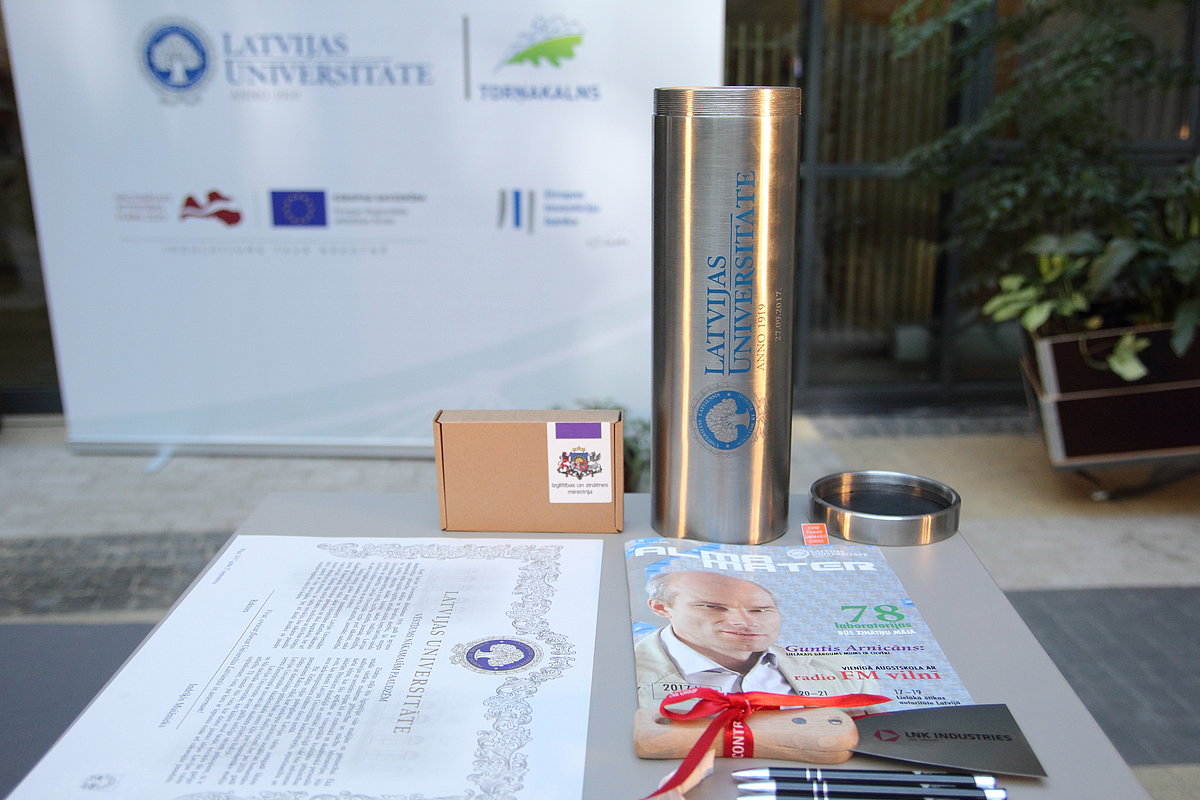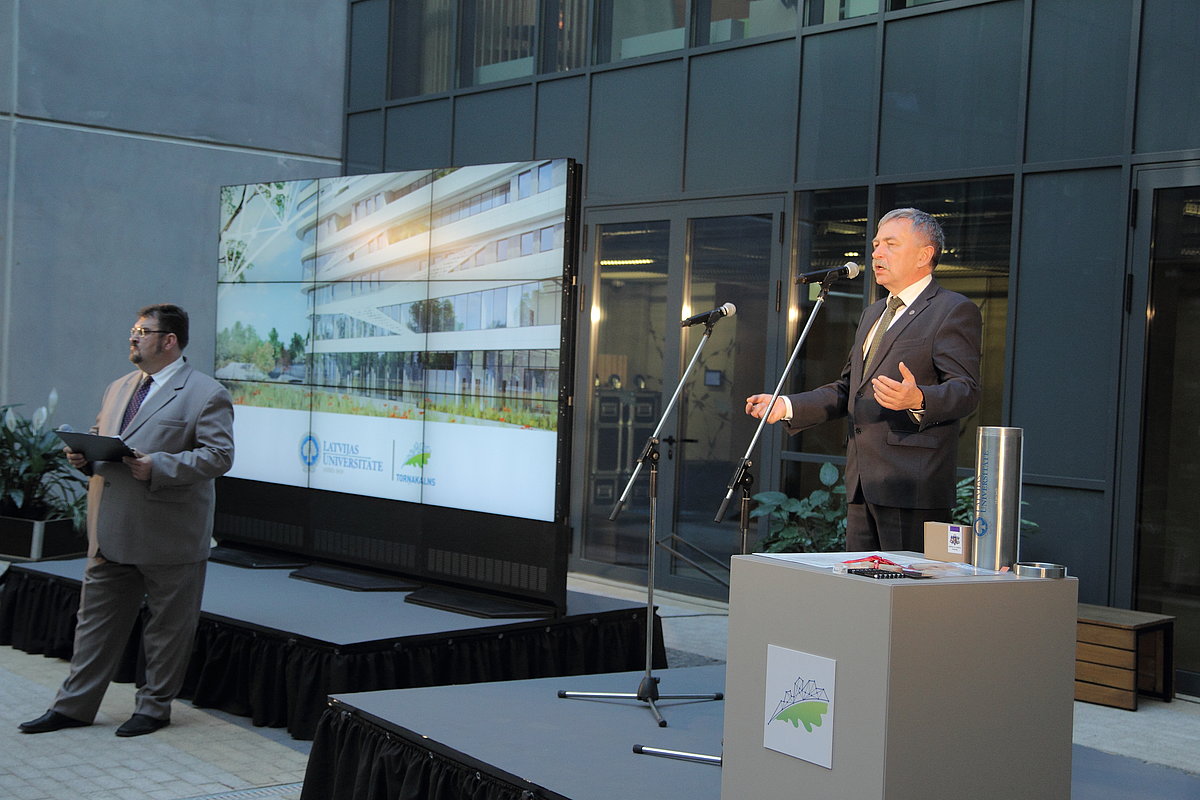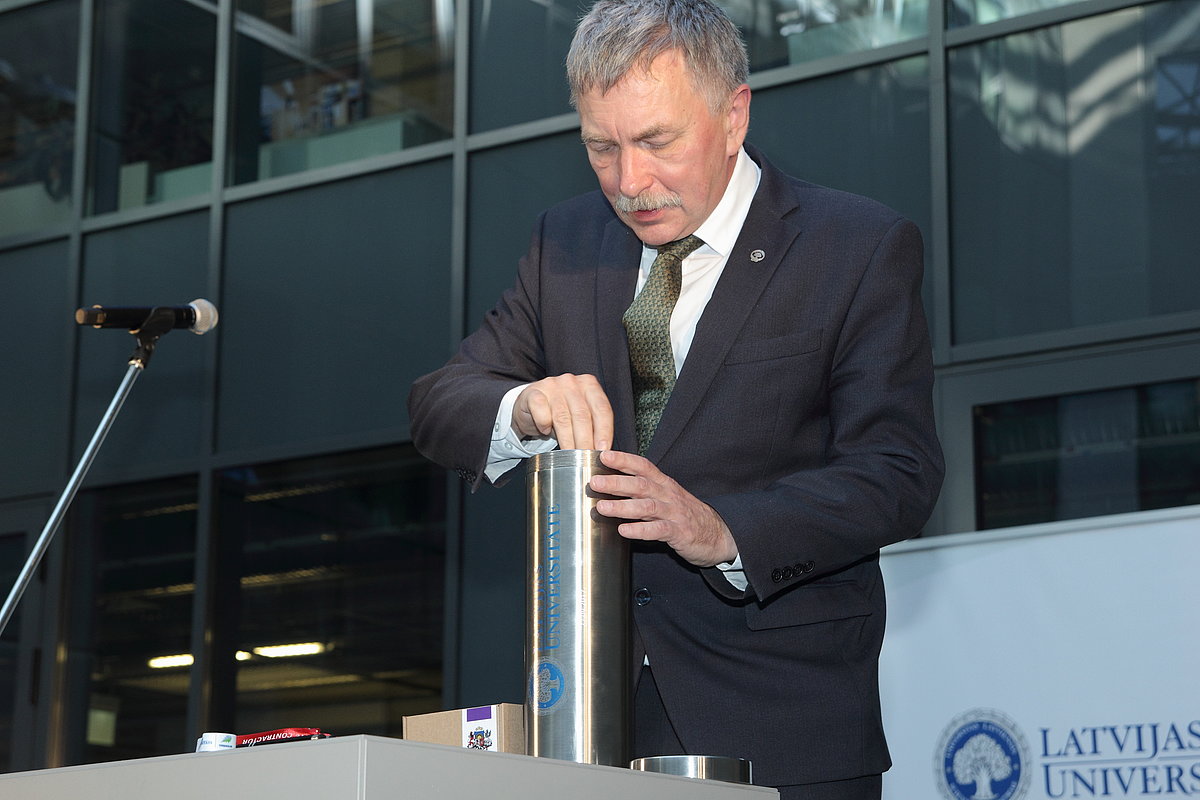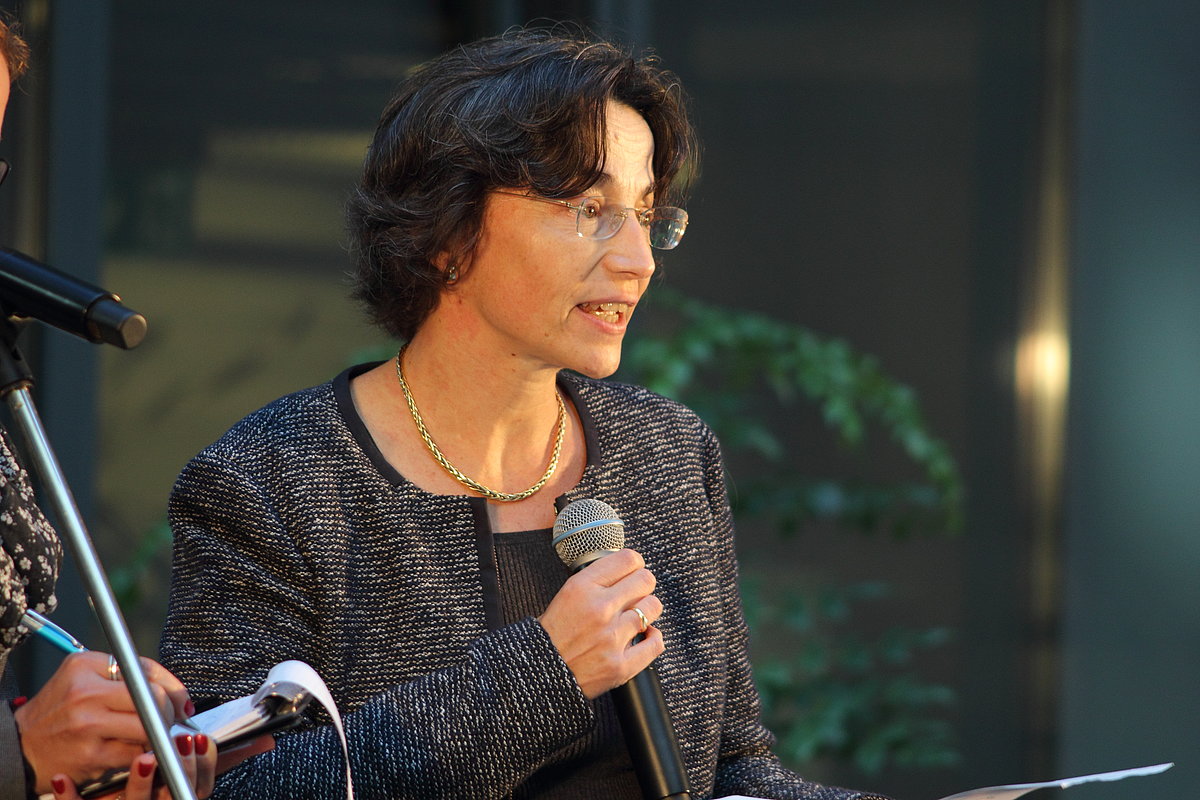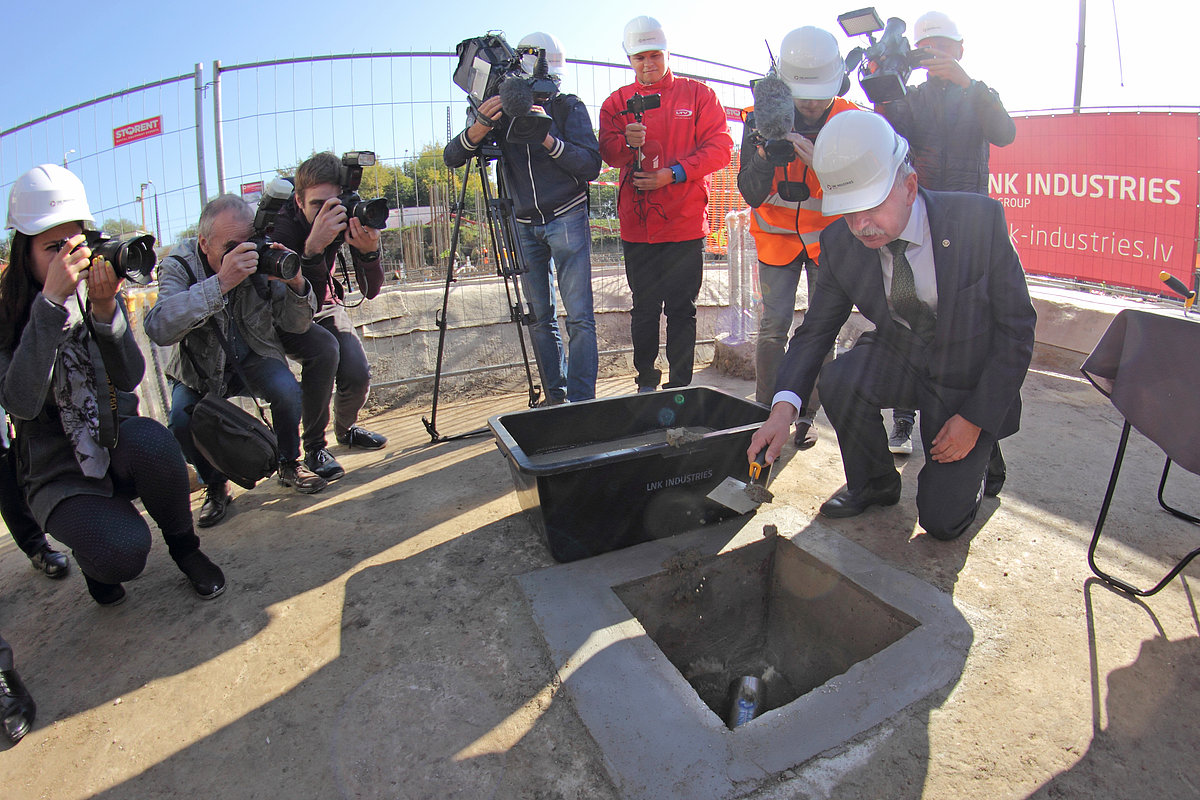Wednesday, September 27, the foundation stone of the University of Latvia (UL) House of science – the second of the three new UL Academic Centre study and research buildings in Torņakalns, was laid.
To celebrate commencing the construction of the building, a time capsule with a message for the next generations was laid in the foundations of the building. The ceremony was attended by the Minister of Education and Science Kārlis Šadurskis, the Director of the European Investment Bank in Northern Europe and Baltic Region Sandrine Croset, the Head of the European Comission Representation in Latvia Inna Steinbuka, the representative of the LNK Industries Group Davids Lipkins, and the Rector of the UL Indriķis Muižnieks.
Step towards development
The House of Science is planned to be completed in the autumn of 2018; in turn, the UL Centre of Social Sciences project is planned to be realized by the end of 2020. The UL Academic Centre will be one of the most modern study and research institutions in Northern Europe, offering an internationally competitive education of the highest quality.
“Since its foundation, the UL has showed continuous progress, and this is the next stage of historical changes not only for the University but also for Latvia. In the future, we will be able to provide students with a wider variety of opportunities, while acquiring new knowledge, and to attract more foreign students and scientists. The Academic Centre is to become an open environment for the creative work, cooperation, knowledge, science, and the brightest minds of the future to be born in,” says the Rector of the UL Indriķis Muižnieks.
The Minister of Education and Science Kārlis Šadurskis indicates that with this cornerstone the UL has taken a large step in its progress. “I believe this is a significant entry in the scientific history of Latvia, Europe and the world. The Centre of Natural Sciences reflects a scientific level of a global scale, proving our competitiveness and the growth potential,” emphasizes K. Šadurskis.
To gather brightest minds
The investment amounting to approximately 38 million euro will be dedicated to building and establishment of the House of Science – 79% received from the European Union’s (EU) structural funds, 14% from the governmental funding, and around 7% is the UL funding. The overall investment planned for development of UL Academic Centre until 2020 will reach 90 million euro. The EU structural funds’ resources have been augmented by 30 million euro of the European Investment Bank to be used for implementation of the third project – the UL Centre of Social Sciences.
In the ceremony, the Head of the European Investment Bank in Northern Europe and Baltic Region Sandrine Croset also addressed the guests, emphasizing that the House of Science will be more than just the stones and concrete shaping a building – it is to become an important infrastructure unit, which will encourage the optimization of the study and research environment, and attract academicians and students from all over the world.
“Today we are really proud – this is a very significant project, and we would like to continue working with such initiatives. I am happy for the University, and I see that this project will bring it forward and stimulate its development. Today, universities are competing with each other, and, consequently, everyone should understand not only the need for ambitions but also a clear strategy, and you have it. This project, of course, is a challenge that will bring the University towards international environment, attract foreign students and researchers, contributing to the expansion and results of the research. And I see that Latvia has a great potential for that – it is located along the coastline of the Baltic Sea in the very centre, it is the heart of the Baltic Region, and this project will help to gather the brightest minds in one place,” says S. Croset in the conversation after the ceremony.
She added that the European Investment Bank recognizes the energy and will towards the progress shown by the administration of the UL, which is crucial for implementing a project of this scale. “The first building was finished in 2015, in accordance with the budget and work plan. It clearly shows the professionalism of the team. These investments are a step towards the realization of the strategy, which we have analysed, and in which we have a complete trust.”
House of Science – home for two faculties and six institutes
House of Science will house the Faculty of Physics and Mathematics, the Faculty of Medicine, and 78 modern science and study laboratories, such as the room without microbes or the pollution control laboratory, as well as 23 auditoriums and seminar rooms. The Centre will be able to host 2000 students and provide 430 work places for scientists and academic staff.
The seven floor building will accommodate the Laser Centre, Medicine Museum, and also six institutes – Astronomy, Geodesy and Geoinformatics, Physics, Atomic Physics and Spectroscopy, Mechanics of Materials, and Cardiology and Regenerative Medicine. The Centre of Formal Sciences will be located next to the Centre of Natural Sciences, which opened in 2015, and both buildings will be connected with a heat insulated passageway. The building of the complex is carried out by the
LNK Industries Group.
“We, the
LNK Industries Group, build various complex infrastructure objects. Today we are especially pleased, because a capsule has been laid for the foundation of the future,” the LNK Group representative Davids Lipkins underlined in his speech. “High quality infrastructure and well equipped study environment is an invaluable investment into the development of education. The higher education, in its turn, is the foundation for development of the country and economic growth, and, of course, the increase of every citizen’s economic welfare.”
Until now, 13 faculties of the UL were located in nine different addresses in Riga, but by 2021 most of the University’s infrastructure will be transferred to the Academic Centre in Torņakalns. The complex will consist of the Centre of Natural Sciences, which opened in 2015, House of Science, Centre of Social Sciences, Centre of Theology, hostels and apartments, and also sports infrastructure. The entire estimated territory of the UL Academic Centre will be 45 448 square meters.
The UL is ranked among the most prestigious universities in the world. The among the 2,7% of the world's best universities, competing with around 26 000 education institutions.
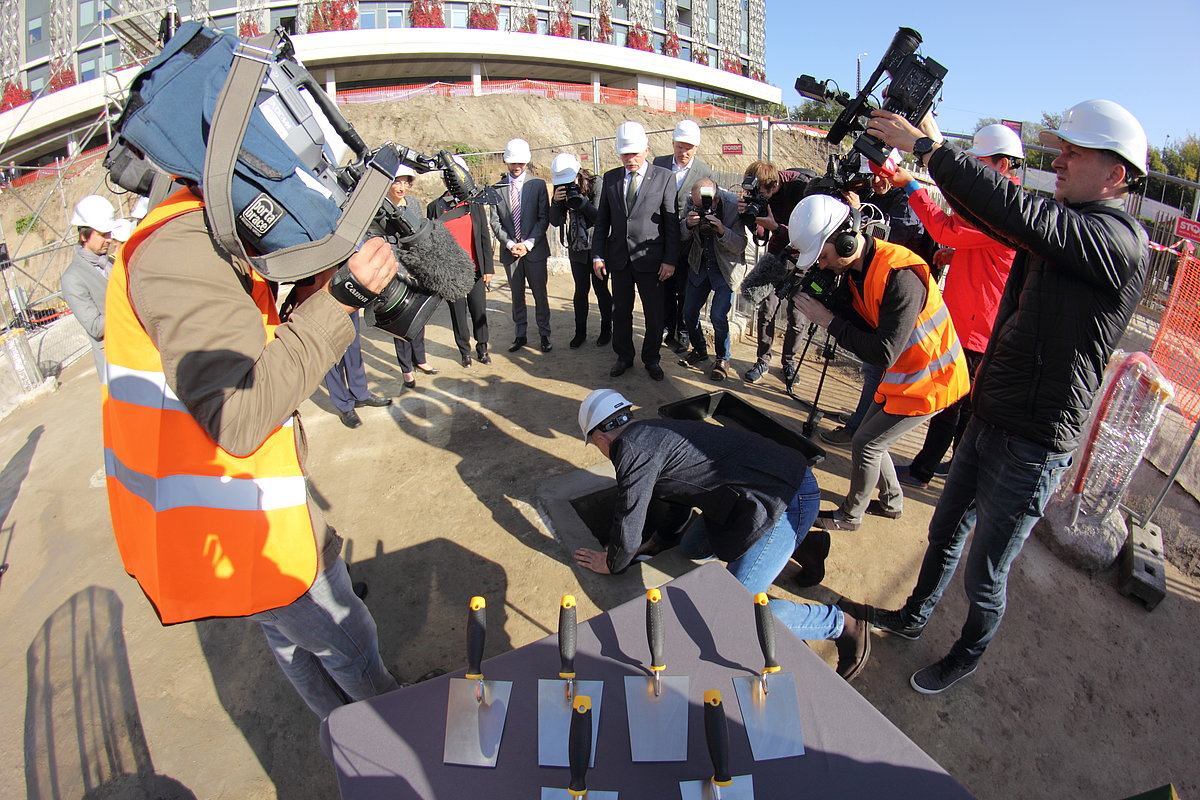

 Academic Centre
Academic Centre